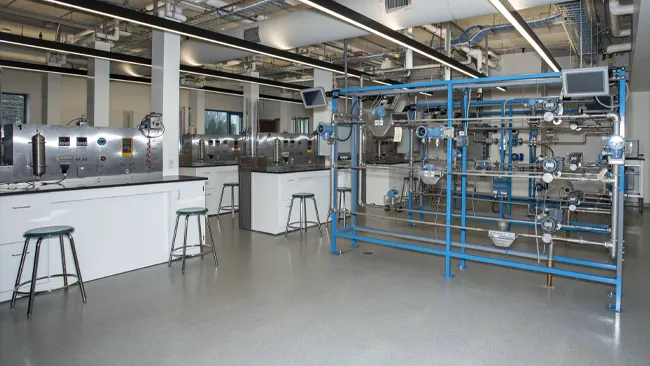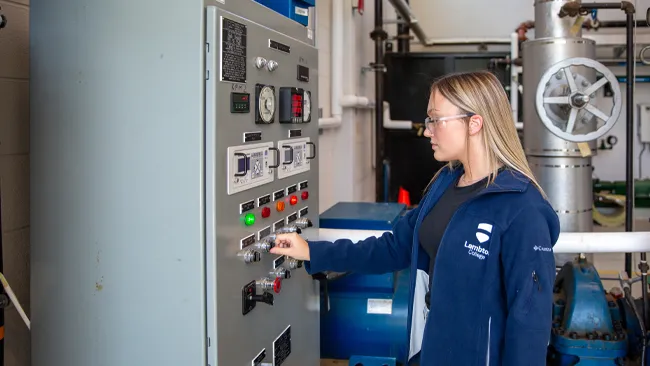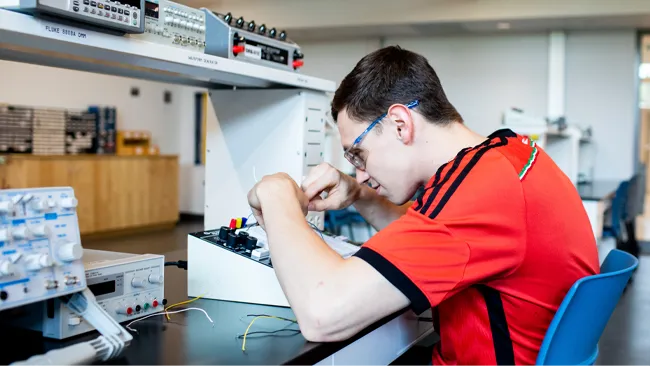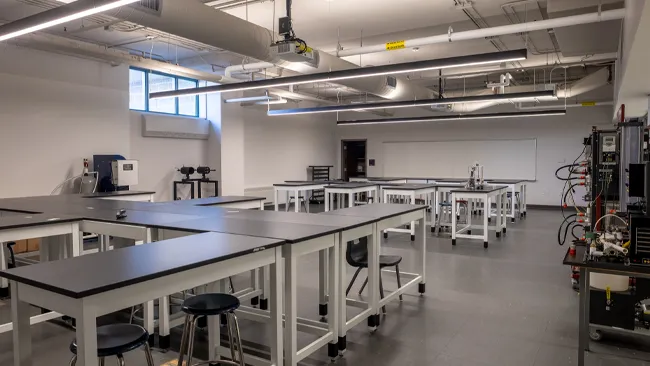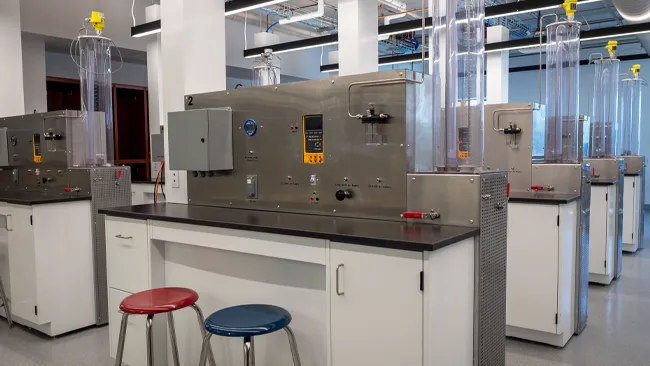
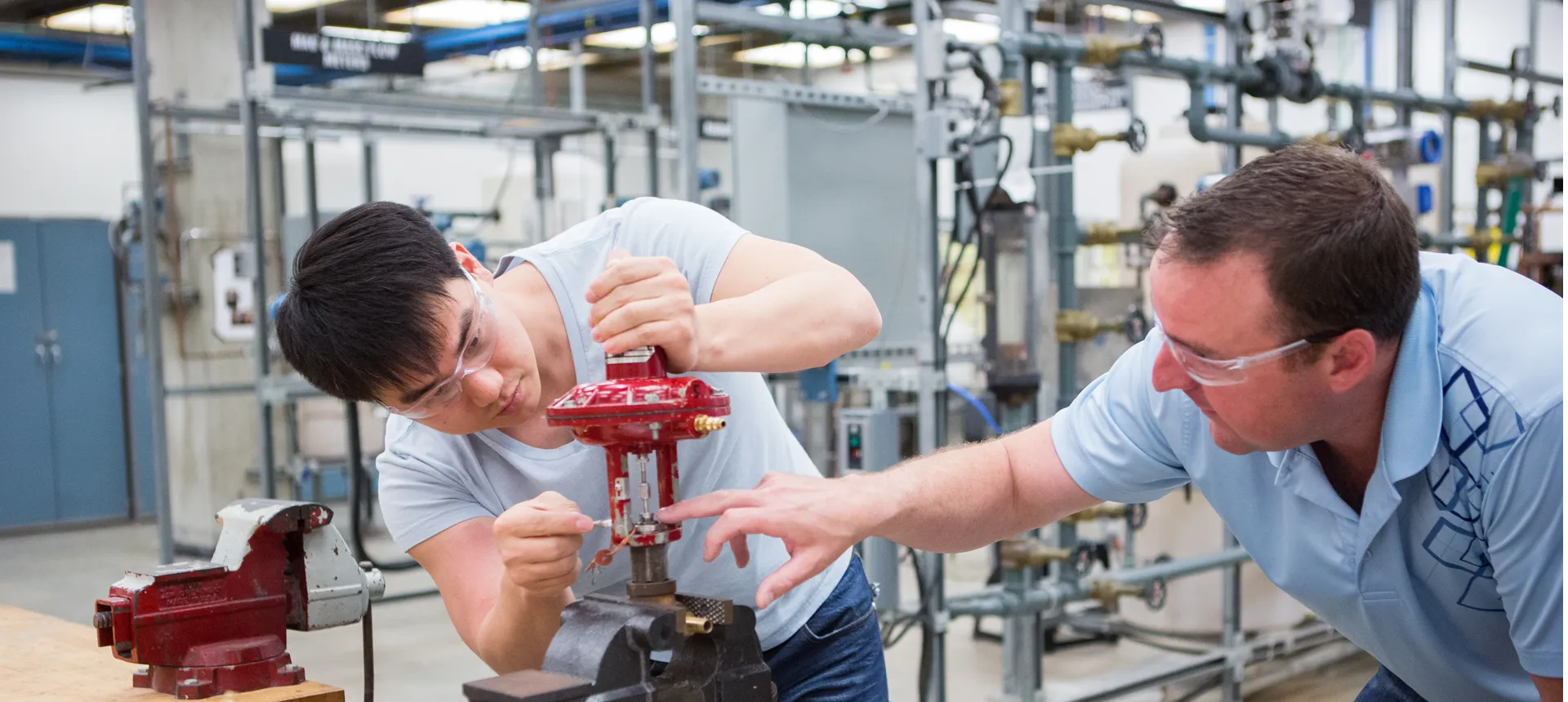
Automation & Instrumentation Technician
Overview
Mesh your hands-on skills and your love for technology and discover the limitless opportunities within the field of automation and instrumentation.
With the increase in use of automated equipment across all major industry sectors, the need for qualified instrumentation and control engineering technicians is evident.
The Automation and Instrumentation Technician program provides the necessary training and technical hands-on skills to operate and maintain control systems field instruments that incorporate digital, pneumatic and hydraulic processes. Instruments are used in the industry to measure and transmit signals to control the quality of products in oil and gas, petrochemical, pharmaceutical, food processing, and manufacturing plants. They are also used in controlling environmental conditions in a variety of industrial and commercial buildings.
Within the program, students will acquire the technical skills and knowledge to carry out maintenance, troubleshooting, configure, calibrate and maintain measurement and indicating instrumentation (pneumatic, analog, digital, etc.) in a variety of replicated industrial settings.
Students will enhance their in-class training through hands-on learning in Lambton College’s Centre of Excellence in Energy & Bio-Industrial Technologies which contains complex lab and pilot plant facilities. This Centre replicates a real-life manufacturing environment and the technologies developed can easily be scaled-up and transferred to an actual operating unit.
Everyday Examples of Instrumentation
Admission Requirements
O.S.S.D. or equivalent with:
- Grade 12 English C or U
- Grade 12 English C or U
Grade 12 Mathematics Requirement
Grade 12 Mathematics for College Technology or any grade 12U mathematics is recommended; Grade 12 Foundations for College Mathematics (MAP4C) minimum final grade is 60%. If the program is highly competitive, students with Grade 12 Mathematics for College Technology or any Grade 12U mathematics will be given preference.
The admissions process is competitive and meeting the minimum academic requirements does not guarantee admission.
Lambton College reserves the right to alter information including admission requirements and to cancel a program or course at any time; to change the program curriculum as necessary to meet current competencies or changes in the job market; to change the pathways to third-party certification bodies; or to withdraw an offer of admission both prior to and after its acceptance by an applicant or student because of insufficient applications or registrations or over-acceptance of offers of admission. In the event Lambton College exercises such a right, Lambton College's sole liability will be the return of monies paid by the applicant or student to Lambton College.English Language Requirements
- IELTS of 6.5
- or -
- TOEFL iBT 79
- or -
- Passed Lambton Institute of English placement test
Meeting the minimum English requirements does not guarantee admission. Students with higher English proficiency scores will receive priority in the admission assessment process.
Women in Technology & Trades
Discover how Lambton College's Women in Technology & Trades (WiTT) group is empowering women to excel in technology and trades.
Visit our WiTT page for more information on mentorship opportunities, events, and resources designed to support your journey in these dynamic fields.
Learn More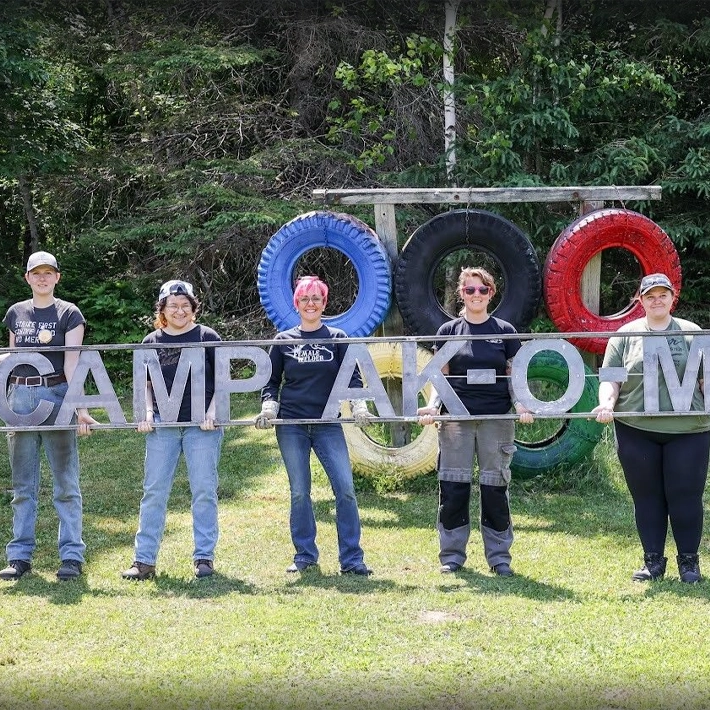
Costs
- Term 1 $7,711.63
- Term 2 $6,925.53
- Term 3 $7,625.53
- Term 4 $6,925.53
Total Cost of Program
Tuition fees are estimates and are subject to change each academic year. Fees do not include books (unless specifically noted), supplies or living costs.
Lambton College reserves the right to alter information including admission requirements and to cancel at any time a program or course; to change the location and/or term in which a program or course is offered; to change the program curriculum as necessary to meet current competencies or changes in the job market; to change the pathways third-party certification bodies; or to withdraw an offer of admission both prior to and after its acceptance by an applicant or student because of insufficient applications or registrations or over-acceptance of offers of admission. In the event Lambton College exercises such a right, Lambton College’s sole liability will be the return of monies paid by the applicant or student to Lambton College.
Additional Fees
-
Lab Coat$40.00
-
Calculator$40.00
-
Safety Shoes$150.00
-
Safety Glasses$20.00
Important Dates, Deadline & Late Fees
For additional information on registration dates, deadlines and late fees please refer to Registration Dates and Deadlines.
Student Fees
A student services fee is included in your tuition.
Health Insurance Coverage
Emergency medical insurance is mandatory for all international students at Lambton College. This includes students who are full-time and part-time and who are on a co-op. This insurance is provided by GuardMe - a third party insurance provider.
See Insurance Costs & DetailsTechnology Requirements
In order to keep pace with the requirements of each and every course in your program, Lambton College requires that each student have access to a laptop while studying at our college.
Labs & Equipment
Courses
Critical Thinking & Writing
In this writing course, students respond to current issues and news articles via various styles of paragraphs and essays. Students practice thinking critically and organize and hone their writing to ensure clarity and correctness in their messages. Students explore different perspectives, and through synthesis, analysis, and response, strive for clarity of message and diplomatic expression of opinion based on fact. One of the pillars of Lambton College is a commitment to sustainability and equity, diversity, and inclusion, including Indigenization of the curriculum; where appropriate, readings in this course will reflect this commitment. Critical Thinking and Writing lays the foundation for a subsequent research-writing course.
Electric Circuits I
This is an introductory course in electricity consisting of fundamental electric principles together with an analysis of simple electric circuits. Emphasis throughout the course is on problem solving. Laboratory exercises complement the material covered in class.
Fundamentals of Instrumentation I
This is an introductory course in process instrumentation and safety. Topics will include WHIMS and an introduction to industrial hazards, Job Safety Analysis, and Work Permits. Basic instrumentation and control loop concepts, instrument signalling, wiring, and calibration techniques will be studied. Pressure measurement will be covered in greater detail. The reading and interpretation of Process and Instrumentation Diagrams will be addressed. The laboratory component will expose the student to the correct use and operation of calibration devices, pressure sensors and measuring instruments.
Mathematics for Technology I
This course reviews and develops concepts in algebra, trigonometry, complex numbers, and vectors with technical applications.
Health & Safety for Industrial Processes
The graduate of this course will have a good understanding of safety aspects of the law, the legal responsibilities of the workplace, and his/her own legal rights and responsibilities, as well as work processes and procedures being used in present-day industry. This course will give them a basic understanding of the Occupational Health and Safety Act and its associated Regulations, and an understanding of health and safety issues in an industrial setting.
General Education Elective
Communications for Technology II
Technical writing differs from most student writing; therefore, it is necessary for students to learn the structure, nuances, and style of technical writing to be successful in completing labs, summaries, and reports. Through research writing and documentation, and through oral presentations, successful students will gain important transferrable skills that provide the basis for technical communication required in their other coursework and the workplace.
Electric Circuits II
This course is designed to extend the student's knowledge and experience in the areas of DC network theorems and alternating current RC, and LCR networks. Emphasis throughout the course is on problem solving. These concepts are supported and reinforced in the laboratory portion of the course.
Fundamentals of Instrumentation II
This course consists of an introduction to some of the fundamentals of process variables such as temperature, pressure, and level measuring instruments. Topics include primary sensing devices, terminology and symbols, and test equipment usage including calibration procedures. The laboratory portion of the course allows the student to become familiar with various types of test equipment, connection of instruments to sense process variation, apply calibration standards, and learn troubleshooting skills.
Mathematics for Technology II
This course contains elements of algebra, and introduces the concept of functions including graphing. It also introduces differential and integral calculus with basic applications.
General Education Elective
Electronic Devices & Circuits I
This course, intended for Instrumentation and Control Engineering Technology students, investigates the characteristics, basic circuits, and biasing techniques of semiconductor diodes, transistors, thyristors, and linear integrated circuits. Operational amplifiers are examined and various applications of Op-Amps to instrumentation and control are explored. The student's knowledge and understanding of electric circuits will grow through the use of lectures and labs.
Process Instrumentation I
This is an intermediate level course in Instrumentation for those going into the field of Instrumentation & Control. Students will develop an understanding of Instrumentation terminology, symbology, and elements of Instrument systems. Methods of flow measurement and installation aspects of devices will be covered in detail. Final control elements such as solenoids, electric motors, and control valves will be covered in detail. The laboratory portion of the course allows the student to become familiar with various types of test equipment, connection of instruments to sense process variation, apply calibration standards and learn troubleshooting skills.
Job Search & Success
This course provides student with skills and knowledge to help support their career search and succeed in the workplace. Students align their personal skill set and goals to guide them on their career paths. They will learn how to effectively conduct a job search, build a professional and well-tailored resume and cover letter, and develop and practice interview techniques. Students will also develop their personal brand to help support effective career networking and aid in their job search. Teamwork and collaboration in the workplace are also discussed. Self-reflection is used to inspire insight and support their professional career journey.
Mathematics for Technology III
This course is a continuation of differential and integral calculus, including trigonometric, logarithmic and exponential functions. The course also contains partial differentiation, methods of integration, and advanced applications of derivatives and integrals.
Statistics for Technology
This course contains descriptive statistics, basic probability, and regression analysis. The course also includes binomial distribution, normal distribution, Student's t-distribution and F-distribution. The statistical ideas of sampling, confidence intervals, and hypothesis testing are introduced. This course also includes elements statistical process control, and system reliability.
General Education Elective
Digital Logic
Electrical Systems & Control
This course is designed to extend the student's knowledge and experience into the areas of single-phase and balanced three-phase alternating current systems. The terminal properties of AC and DC motors, generators and transformers are thoroughly investigated, and the student is introduced to the control strategies and devices most commonly used with these machines. Emphasis throughout the course is on problem solving. These concepts are supported and reinforced in the laboratory portion of the course.
Microcontrollers & Sustainable Systems
This course is a continuation of ICS-3305. Topics will include: principles of measurement of additional process variables such as weight, density, and humidity; control valve technologies; panel instruments; sizing and application of control valves; instrument air systems; hazardous area classifications; electrical wiring practices and interpretation of loop wiring diagrams; overview of digital communications network structures and protocols; and an introduction to fiber optics technology. A series of laboratory experiments will illustrate the measurement principles, calibration and installation techniques for a variety of sensors and control valves.
Programmable Logic Controllers I
Mathematics for Technology IV
This course contains the analysis and applications of arithmetic, geometric, and power (Maclaurin and Taylor) series as well as the construction and application of trigonometric (Fourier) series. Methods of solving first and second order differential equations are introduced, including the use of Laplace transform.
Contact
Centre for Global Engagement
LAMBTON COLLEGE SARNIA
1457 London Road
Sarnia ON N7S 6K4
After Graduation
Employment Opportunities
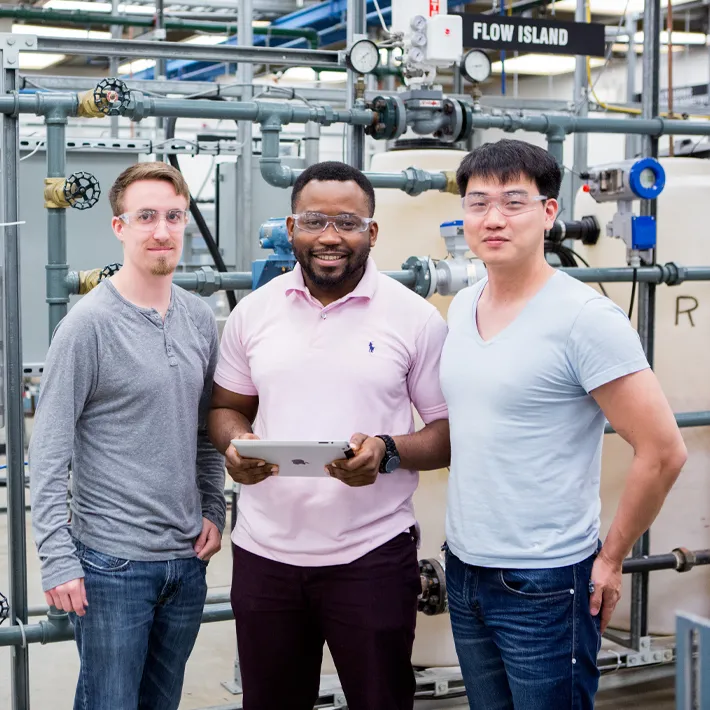
Our graduates find employment as instrument technician trainees and are involved with the installation, maintenance and repair of pneumatic and electronic instrumentation. Opportunities for employment as an instrument technician exist in the following industries: chemical, petroleum refining, food processing, auto manufacturing, steel production, and pulp and paper.
Pathways
Transfer to Programs outside of Ontario
Looking for Support After Graduation?
The International Graduate Services & Support Centre (GSSC) is a place dedicated to assisting International alumni as they seek employment and settle into Canadian life following graduation.
Post-Graduate Employment
International students who successfully complete their programs of study at Lambton College may be eligible to apply for a Post-Graduation Work Permit (PGWP) Program. This program allows students to gain valuable Canadian work experience.
A work permit under the PGWP may be issued for the length of the study program, up to a maximum of three years. A post-graduation work permit cannot be valid for longer than the student's study program, and the study program must be a minimum of eight months in length. The length and approval of the PGWP is determined solely by Immigration, Refugees and Citizenship Canada (IRCC).
Students must meet the eligibility requirements to apply for a post-graduation work permit.
Immigration Regulations & Changes
Immigration regulations are legislated by the Federal Government of Canada and are subject to change at any time without notice. Students are responsible for ensuring that they are in compliance with all Immigration, Refugees and Citizenship Canada regulations at all times during their studies and while in Canada. Lambton College staff are not authorized to provide advice or guidance on immigration-related matters. Prospective applicants and current students should consult the Immigration, Refugees and Citizenship Canada website or call the IRCC Call Centre at 1-888-242-2100 to answer or clarify any immigration-related questions or information.
More Information
Student Responsibilities
- Course and program delivery schedules are proposed and subject to change for each intake.
- Students are required to bring their own laptop with wireless capability.
- Students are advised to bring an official copy of their most recent police clearance, driver's license, and vaccination record from their home country.

Technology Requirements
It is recommended that students purchase a laptop with a Windows operating system.
Internet Speed Requirements
For best performance for students learning remotely, an internet connection with a minimum of 40 Mbps download and 10 Mbps upload speed is recommended in order to effectively use video conferencing and remote lecture delivery software as well as, other online resources remotely. Due to the large area over which students may be dispersed, we are unable to recommend a specific provider, so you will need to inquire around your area to find one that best suits your needs.
Minimum Laptop Requirements
In order to access the internet and virtually-delivered software and courseware, student laptops should include the following at a minimum. By meeting the following specifications, students will be equipped to access software and courseware on their laptop through the internet:
- Intel i5 8th Gen Processor or equivalent
- 16 GB of RAM (with a minimum of 8 GB)
- 100 GB HDD or more
- HD Graphics
- Webcam with a microphone
- Wireless 802.11n/ac 5ghz capable
- Windows Operating System (Windows 11)
Please note that Chromebooks and MacBooks may not support all software required for your program; students should verify compatibility with their professors.
Software
To ensure students are getting the most our of their classroom experience, some software will be required.
Lambton College has made this software easily accessible online. Students can leverage our Microsoft Office 365 software packages and services. In addition, much of the software you require for your courses will be available on demand for use on any device - on or off campus.



